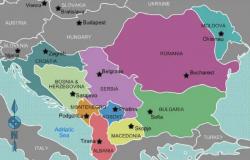
Bulgaria is heading for its sixth round of early elections after reaching a new political deadlock last week. Unlike similar situations in Romania, none of the political formations in Bulgaria wanted to be part of a new Coalition.
The populist party ITN refused the mandate to form the government, shortly before a government rotation. The center-right party GERB and its former coalition partner “We continue the change (PP)” declared that they could not form a new government, despite the agreement that provided for a government “rotation”.
Ziare.com spoke with foreign policy analyst Miroslav Tașcu Stavre, who says that regardless of the power changes in Bulgaria, the government pursued a plan that transcends party interests.
“Bulgaria had a country plan, a compass, and regardless of the form that governed Bulgaria’s strategic goals remained the same. They have been extremely steadfast about the Eurozone, it is true that after the crisis we also went through in the 90s, they had an extremely tough fiscal and economic rigor. They initially tied the lever to the German mark, then to the euro, and somehow even if the assumed goal of entering the euro zone did not materialize in time, they did not give up on it”.
The arguments brought by the party that refused the rotary are related to the will of the citizens and the exercise of democratic rights, say ITN leaders.
“Elections are the highest form of democracy, we will keep this file for a few more seconds and we will return it to you empty, with an unfulfilled mandate”, Ivailo Valcev, the vice-president of the ITN parliamentary group, told Radev, during a meetings.
Government rotation, same situation two different reactions
The same arguments do not apply, however, in Romania, where, in the name of economic stability, a form of government was created that would succeed a rotary.
“I somehow tend to agree with you regarding the coherence of policies and a country plan regardless of the government formula. In our case, unfortunately, or what we observe, is that this only happened in a crisis context. It is not a strategy that will bring us even more political stability, but it is a very comfortable way of governing for two major parties. Who managed to secure the majority at the local level, not just at the parliamentary level. They will capture practically the entire political spectrum.
Those who study political science call this the ‘dominant’ model. Here is a dominant Alliance,” says the foreign policy analyst.
On the other hand, in Bulgaria the underground economy or corruption are problems that are scored by international forums as being more serious than in Romania, even the most serious of the member states.
Country ratings and national development plans should be a priority for the Romanian government, points out the analyst. Regarding the decisions taken by the Romanian leaders, they were not imposed ‘per se’ by the European Union or other forums, the requirement being only economic stability and a coherent governance. In terms of budget deficit and tax collection, Bulgaria has made progress, while Romania has fiscal revenues at 27% of GDP. Bulgaria, with lower tax rates, collects tax revenues of 32% of GDP.
“Bulgaria seems, at least from the statistics, that it is closer to having fulfilled part of its objectives, or in any case, it does not change the route depending on the coming to power of one political formation or another. The European Union does not tell you to do something or not to do something, the only ones who do it are the politicians, the elected, the representatives are sovereign after all. But, on the other hand, the EU gives you, but does not put it in your pocket.
If we have overcome some conditionality very hard MCV (Verification and Cooperation Mechanism), now there is no conditionality. Those who make the National Development Plan and implement it at the local level are the actual Romanians”, says the specialist.
The institutions responsible for monitoring good governance are not, however, to be ignored when it comes to the financial part in which Romania or Bulgaria have both advantages and responsibilities as EU members.
“Yes, the World Bank, the International Monetary Fund or the OECD (Organization for Economic Cooperation and Development) comes and shows you a mirror, and says: Good people, if you keep going at this pace, you have a problem.
I was looking at some statistics related to Romania, the highest inflation in the EU. Despite the fact that we did not have the greatest at the beginning of the crisis. I don’t know how we managed, through the politicians’ measures or are there other factors, to have 7% inflation”, Tașcu Stavre also states.
Compared to Bulgaria, which has an inflation of 4%, the index is higher in Austria (4.3%), Slovakia (4.4%), Poland (4.5%), Croatia (4.8%), Estonia (5.0%) and Romania (7.3%). However, stability is a key point of joining the eurozone, and the average should be around 2%.
The budget deficit also has consequences for our country, Romania has no other quick financing solutions than loans, if we are trying to avoid tax increases. Or the interest rates could be higher and higher if the problem of the budget deficit is not settled.
“Politicians, when we have investments with European funds, they go and cut the ribbon, because it’s the Brăila Bridge, another kilometer of the highway, they assume their successes, and when it comes to assuming, it’s much easier to throw the cat and say , the EU does not leave us. We do not know what is happening with PNRR.
There is some money that must be spent in four years, without postponements, as with cohesion funds. I am very surprised, we are halfway through the period and the absorption rate is very low. Will we be able to make these investments?” says the analyst.
Joining the euro zone. Romania forgot about this wish
Both countries have expressed their intention to join the euro zone, only that our country’s neighbors set deadlines from half to half a year, while in Romania the subject has not been reopened to public attention. Bulgaria plans to join the eurozone with a delay of one year and six months compared to the original plan. The neighboring country has announced that the deadline for the euro to become the official currency is mid-2025.
“Somehow I would ask, not sarcastically, do we have any country plan regarding the entry into the euro zone? Because I haven’t heard anything from the governor of the National Bank about this matter. Bulgaria is, unfortunately, very similar to Romania.
There is a discrepancy between Sofia and other areas, the Black Sea ports, and the rest of the population. We fought for the last places regarding these Euroregions. Well, we were in last place, and Bulgaria”, concludes Miroslav Tașcu Stavre.
Tags: Bulgaria maintains balance drastic political extremely tough fiscal economic rigor
-




